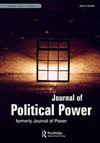Memorialisation and its denial: slow resistance through derealisation in Kiruna, Sweden
IF 1.3
Q1 POLITICAL SCIENCE
引用次数: 1
Abstract
This paper demonstrates the role that Judith Butler’s concept of derealisation has to play in the analysis of slow and structural violence within extractivism. I deploy derealisation to examine the denial of public mourning and memorialisation of the evacuated and ruined former city centre of Kiruna, Sweden, by the mining company LKAB. Kiruna is home to the largest underground iron-ore mine in the world. The ore-body extends over two kilometres directly below Kiruna. As a result of ongoing mining practices threatening the stability of the city, Kiruna is currently in the process of a 20-year resettlement. By contrasting the roles of enforced silence and silence as a means of creating a collective, often counter-hegemonic narrative, I highlight the bifurcated roles silence plays in Kiruna, speaking to the simultaneity of structural violence and the emergence of resistance as slow. Resistance here is argued to be emergent in the desire for my informants to collectively memorialise the ruination of the Deformation Zone, the former city centre now owned by LKAB. The fieldwork for this research was conducted ethnographically in Kiruna between September 2020 and August 2021, using semi- and un-structured interviews and an abductive approach.纪念及其否定:在瑞典基律纳,缓慢的抵抗使人们失去了现实感
本文论证了朱迪思·巴特勒(Judith Butler)的失现实性概念在分析榨取主义中的缓慢和结构性暴力中所起的作用。我用现实主义来审视矿业公司LKAB拒绝公开哀悼和纪念被疏散和毁坏的瑞典基鲁纳前市中心的行为。基律纳拥有世界上最大的地下铁矿。矿体在基律纳正下方延伸超过两公里。由于持续的采矿活动威胁到城市的稳定,基律纳目前正在进行为期20年的重新安置工作。通过对比强制沉默和沉默作为一种创造集体的、通常是反霸权叙事的手段的角色,我强调了沉默在基律纳扮演的双重角色,即结构性暴力的同时性和抵抗的出现是缓慢的。这里的抵抗被认为是为了让我的线人集体纪念变形区的毁灭,变形区是前市中心,现在归LKAB所有。本研究的实地调查于2020年9月至2021年8月期间在基律纳进行,采用半结构化和非结构化访谈以及绑架方法。
本文章由计算机程序翻译,如有差异,请以英文原文为准。
求助全文
约1分钟内获得全文
求助全文

 求助内容:
求助内容: 应助结果提醒方式:
应助结果提醒方式:


